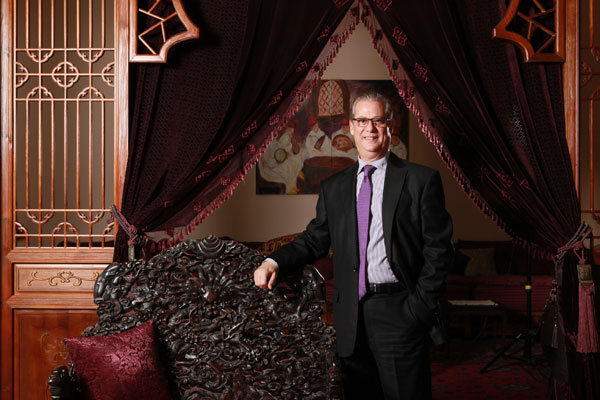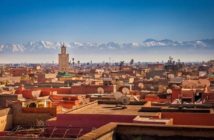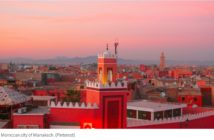By Mike Peters ( China Daily)
 Jaafar Alj Hakim is dedicated to letting Chinese know his country, Morocco. Provided to China Daily
Jaafar Alj Hakim is dedicated to letting Chinese know his country, Morocco. Provided to China Daily
Morocco’s Jaafar Alj Hakim can talk the talk of any veteran ambassador: diplomacy, trade,cultural exchanges. But right now he’d rather talk about the beach.
“People obviously like the Kingdom’s 3,500 km of coastline,” he says, noting that the sunny sandand blue sea has a special appeal for the some 7,000 Chinese who visit every year.
“The imperial cities of Fez, Meknes, Marrakesh and Rabat show the heritage of the differentdynasties that succeeded in Morocco and left a world of grandeur,” he says, while coastal Agadirboasts a fine-sand bay, golf resorts, bird-watching and a leisurely escape from the workadayworld.
Hakim notes that his thousand-year-old kingdom has a recorded history with China that goesback seven centuries, thanks to the legendary travels of Ibn Battuta. That Moroccan traderexplored China during the 28 years he journeyed across the East, taking a scholarly interest inthe Middle Kingdom. Ibn Battuta trekked more than 121,000 km, a figure unsurpassed by anyindividual explorer until the Steam Age made horses unnecessary 450 years later. His book hasnow been published in Chinese.
Hakim recently celebrated Ibn Battuta’s time in China by hosting a special art exhibit at theembassy.
Twenty-one Chinese artists were invited to explore Morocco’s history and culture in their work.Qiu Jun’s paintings reflect the romance both peoples have with the horse. Zhao Biqin’s colorfullandscapes showcase “Moroccan women’s love for their country and their expectations of abeautiful future”.
Kong Fantao and Ma Dongqin capture street scenes in cool blues and greens, while Song Lin’soil painting depicts Ibn Battuta en route to China with “a sense of triumphalism”.
The legacy of Ibn Battuta lingers today, measurable on the map. Most of the Moroccans in Chinatoday are not in Beijing or Shanghai, but in Guangzhou and Shenzhen. “We are still traders,” hesays with a smile.
In addition, about 250 Moroccan students study at universities around the country. When theyfinish their studies, Hakim says, they will enter the world economy with tremendous advantages,especially in China.
“Imagine, they come here already fluent in Arabic, in French and in English,” the ambassadorsays. “Now they have a good education, they are trained in international business – and theyspeak Chinese. The opportunities are fantastic.”
In Morocco, meanwhile, there are now Confucius Institutes teaching Mandarin at universities inboth Rabat (since 2009) and Casablanca (2011), with a new one scheduled to open in Fez laterthis year, he says.
“Economic cooperation between the two countries has been growing, with a trade volume thattopped $3 billion in 2011,” he says, a figure that makes China the third-largest supplier ofMorocco and China’s sixth-largest export destination in Africa. Morocco, for example, importsmore green tea from China than any other nation. Telecommunications, infrastructure, mining,solar energy and fishing are important trade sectors between the two countries.
As ambassador, he has traveled to “the four corners of China”. A sports and golf enthusiast, heenjoys exploring nature with his family, but he still has much of the continent-sized country tosee.
That’s helped him see tourism development between the countries as a two-way street. About11,000 Moroccan tourists visited China in 2012. He’s hoping that a direct flight, perhaps betweenGuangzhou and Morocco, can materialize as early as this year. Right now, getting to Moroccogenerally requires a stop in Paris first – not necessarily a hardship for a Francophone country.
Meanwhile, he’s dedicated to letting Chinese know his country’s great traditions and modernculture.
“In Fez we have the oldest university in the world that is still operating,” he says, and famousfestivals include one for international religious music in February. “Morocco also has a road rally,something like the famous Dakar Rally, but just for women drivers,” he says.
Hakim has been Rabat’s envoy to China since 2009, but he’s been back and forth since his firstvisit in 2000.
“So I can say that we are old friends,” he says, and he’s enjoyed watching the dynamic vigor ofmodern China.
“It is undeniable that China offers the fastest developing market in Asia and enjoys rapid annualeconomic growth, but their success is also everyone’s.”
michaelpeters@chinadaily.com.cn






